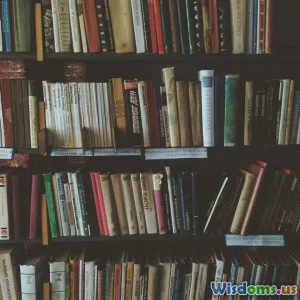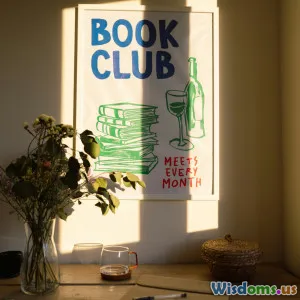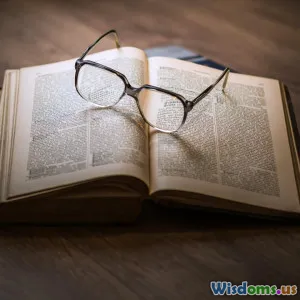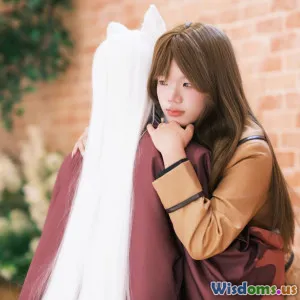
Five Classic Novels You Might Rethink This Year
9 min read Explore five classic novels through a fresh lens, uncovering new themes and insights to inspire your next reading journey. (0 Reviews)
Five Classic Novels You Might Rethink This Year
Classic novels often occupy a revered spot on our bookshelves—or at least in our cultural consciousness. Titles like "Pride and Prejudice" or "Moby-Dick" are frequently mentioned in literary circles, taught in classrooms, or referenced in popular media. But have you ever stopped to reconsider these classic works with a fresh perspective?
This year, instead of approaching these novels as untouchable relics, why not explore them anew? Analyzing their themes, characters, and social contexts through contemporary lenses provides valuable insights about both the works themselves and the changing world around us. Below, we take a deep dive into five classic novels you might rethink, and discover why these stories continue to resonate or challenge us in unexpected ways.
1. "To Kill a Mockingbird" by Harper Lee: The Complexity Beyond the Hero
Widely heralded for its profound commentary on racial injustice in America’s Deep South, "To Kill a Mockingbird" remains one of America’s most beloved novels. However, recent reconsiderations push readers to examine characters and themes with a more critical eye.
Reassessing Atticus Finch
For decades, Atticus Finch was idolized as the moral compass of the novel—a lawyer who stands bravely against racial prejudice. Yet, some contemporary scholars argue that Atticus’s approach to justice and his paternalistic attitude reflect complexity rather than pure heroism. His measured tone, adherence to law, and maintaining social order sometimes seem to prioritize the status quo over revolutionary change.
Carolyn J. Rose, professor of English, points out: "Atticus embodies a white savior narrative that we must question, especially as it may sideline the experiences and agency of Black characters like Calpurnia and Tom Robinson."
Scout’s Coming of Age as a Lens
Looking at Scout’s growth, the story also becomes a nuanced study on how societal norms shape individuals. Beyond racial themes, the novel raises questions about gender roles, class, and morality.
Why Rethink?
Reconsidering this novel does not diminish its importance but rather deepens our understanding of its social complexity. It invites discussion on the incomplete nature of progress and the ways literature can both reflect and perpetuate societal challenges.
2. "Moby-Dick" by Herman Melville: An Ecological and Psychological Odyssey
Often summarized as a simple tale of obsession, "Moby-Dick" has layered significance spanning ecological commentary, human psychology, and the meaning of existential struggle.
The Whale as Symbol and Ecological Signifier
The white whale is more than a foe to Captain Ahab; it's a symbol of nature’s untamed power. Modern eco-criticism reads the novel as an early meditation on environmental limits and the human desire to dominate.
According to literary scholar Lawrence Buell: "Melville’s text performs a cautionary tale about hubris and ecological disruption, which resonates with today’s climate crisis."
Psychological Depths and Madness
Ahab’s obsession also represents the perilous human psyche grappling with purpose, madness, and fate. This exploration anticipates much later existentialist thought.
Why Rethink?
By viewing "Moby-Dick" through ecological and psychological frames, we enrich our appreciation and find urgent contemporary relevance in a sprawling 19th-century narrative.
3. "Pride and Prejudice" by Jane Austen: Social Satire or Subversion?
Jane Austen’s sparkling wit has charmed readers for generations, but beneath the delightful banter lies a sharp critique of 19th-century English social structures.
Gender and Class Interplay
The novel's exploration of marriage often reads as a practical economic necessity within a patriarchal system. Elizabeth Bennet's assertive personality contrasts with societal expectations for women.
Literary critic Claudia L. Johnson argues: "Elizabeth’s confident rejection and pragmatic acceptance of marriage proposals reflect Austen’s complicated stance on female agency."
Marriage as Both Strategy and Desire
This duality raises questions—are Austen’s depictions endorsing traditional norms or subtly undermining them? The novel oscillates between reinforcing social conventions and advocating personal choice.
Why Rethink?
Rethinking this classic encourages richer dialogues on class mobility, gender roles, and marriage dynamics as they relate to historical and modern social norms, empowering readers to analyze parallels today.
4. "1984" by George Orwell: Prescience and Relevance in the Digital Age
Orwell’s dystopian novel often serves as a cautionary tale about totalitarianism. Yet, revisiting "1984" in the current era of mass data, surveillance, and fake news reveals hauntingly accurate predictions.
Surveillance Society Realized
Today’s digital platforms and governments wield unprecedented power to monitor, edit, and influence information almost in real time—echoing Orwell’s "Big Brother".
Language and Thought Control
Concepts such as "Newspeak" show how language shapes thought and restricts dissent. Algorithms curating news feeds demonstrate this phenomenon in practice.
Why Rethink?
Understanding "1984" with current realities prompts critical questions about privacy, freedom, and autonomous thought, urging active engagement rather than passive acceptance.
5. "The Great Gatsby" by F. Scott Fitzgerald: The Mirage of the American Dream
This portrait of Jazz Age America has long been celebrated for its lyrical prose and tragic beauty, but it also serves as a sharply charged criticism of the American Dream.
The Illusion of Success
Jay Gatsby’s glittering parties and wealth cloak a profound emptiness and deception. His dream, rooted in reinvention and love, ultimately confronts harsh social realities.
Class and Identity
The novel foregrounds the tensions between new money and established elite, questioning the accessibility and authenticity of the American Dream.
Scholar Matthew J. Bruccoli summarizes: "Gatsby’s tragedy highlights the cost of chasing an ideal constructed by societal myths, exposing the fragility beneath American optimism."
Why Rethink?
In an era marked by growing inequality and reevaluation of success norms, "The Great Gatsby" invites renewed reflection on cultural myths and personal aspirations.
Conclusion: Your Next Reading Adventure
Revisiting classic novels with fresh eyes can transform your reading experience. These works, far from being static artifacts, adapt to new contexts and illuminate evolving human concerns.
Whether through the layers of race and justice in "To Kill a Mockingbird," ecological warnings in "Moby-Dick," gender dynamics in "Pride and Prejudice," technological anxieties in "1984," or the complexities of the American Dream in "The Great Gatsby," each novel opens a space for thoughtful reflection.
So this year, set aside your prior assumptions. Pick up one—or all—of these classics again. You may be surprised by what you discover and inspired anew to engage with both literature and the world around you.
Happy reading—and rethinking!
Rate the Post
User Reviews
Popular Posts



















